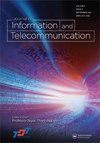Multi-agent reinforcement learning for traffic congestion on one-way multi-lane highways
IF 2.7
Q2 COMPUTER SCIENCE, INFORMATION SYSTEMS
Journal of Information and Telecommunication
Pub Date : 2023-03-07
DOI:10.1080/24751839.2023.2182174
引用次数: 2
Abstract
ABSTRACT In the last decade, agent-based modelling and simulation has emerged as a potential approach to study complex systems in the real world, such as traffic congestion. Complex systems could be modelled as a collection of autonomous agents, who observe the external environment, interact with each other and perform suitable actions. In addition, reinforcement learning, a branch of Machine Learning, that models the learning process of a single agent as a Markov decision process, has recently achieved remarkable results in several domains (e.g. Atari games, Dota 2, Go, Self-driving cars, Protein folding, etc.), especially with the invention of deep reinforcement learning. Multi-agent reinforcement learning, by taking advantage of these two approaches, is a new technique that can be used to further study complex systems. In this article, we present a multi-agent reinforcement learning model for traffic congestion on one-way multi-lane highways and experiment with six reinforcement learning algorithms in this setting.单向多车道高速公路交通拥堵的多智能体强化学习
在过去的十年中,基于智能体的建模和仿真已经成为研究现实世界中复杂系统(如交通拥堵)的一种潜在方法。复杂的系统可以被建模为自主代理的集合,它们观察外部环境,相互作用并执行适当的动作。此外,强化学习是机器学习的一个分支,它将单个智能体的学习过程建模为马尔可夫决策过程,最近在几个领域(例如Atari游戏、Dota 2、Go、自动驾驶汽车、蛋白质折叠等)取得了显著的成果,特别是随着深度强化学习的发明。多智能体强化学习是一种利用这两种方法对复杂系统进行深入研究的新技术。在本文中,我们提出了一种用于单向多车道高速公路交通拥堵的多智能体强化学习模型,并在此设置下对六种强化学习算法进行了实验。
本文章由计算机程序翻译,如有差异,请以英文原文为准。
求助全文
约1分钟内获得全文
求助全文
来源期刊
CiteScore
7.50
自引率
0.00%
发文量
18
审稿时长
27 weeks

 求助内容:
求助内容: 应助结果提醒方式:
应助结果提醒方式:


